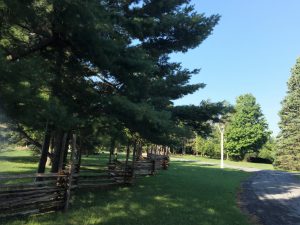 Jeremiah 2:12-13
Jeremiah 2:12-13
Be appalled at this, heavens; be shocked and utterly desolated! This is the Lord’s declaration. For my people have committed a double evil: They have abandoned me, the fountain of living water, and dug cisterns for themselves—cracked cisterns that cannot hold water (CSB).
God’s story takes in all aspects of human experience. A novice to the truth might anticipate that it would only speak of joy and glory. Yes, it ends in the fullness of both glory and joy. However, along the way, as the Lord of glory interacts with people, he feels our sorrows, our ugliness, our ruin. The Forever Blessed One calls us to feel the disgust caused by people’s rejection of his joy and glory. The verbs are meant to shake us out of our complacency: Be appalled… be shocked… utterly desolated. Why such horror? It is because the visible people of God had committed the evil exchange, that lies at the core of fallen humanity (cf. Romans 1:18-23). What is this evil? It is the exchange of the all-glorious God for worthless idols.
The Father calls this a double evil. First, people abandon God. Abandonment of others is very much a part of this world. One day there is love, joy, peace, acceptance, and friendship. The next is the awfulness of rejection, the benefits of friendship gone. You may weep if you have been abandoned by family or friends. Watching his people walk away is intensified because the Lord fully understands what they are walking away from—the fountain of living water. Fresh water is necessary for life, but people want the dust of death. Second, people make substitutes for God, but the substitutes are defective. Instead of the fountain, they want cisterns, and they’re cracked, unusable cisterns at that! If you have ever seen someone trade a loving family for some ruinous pleasure, you know the tearful outrage that this brings to one’s heart. God spoke through Jeremiah to call them back from this senseless, double evil.
This word is not simply for Israel 2600 years ago. It is for us. The temptation to commit this double evil surrounds us, and because of remaining sin, it can stir within us. Our Father in heaven calls us to a joyous walk in the light with him. If we walk in the light as he himself is in the light, we have fellowship with one another, and the blood of Jesus his Son cleanses us from all sin (1 John 1:7). Read his word, think on it, talk to your God, and share your life with him. Give thanks for the blessings of his grace; dare to ask for more grace.
Do not abandon God on Monday or any other day, because it is gray and rainy, because other people are making your life miserable, or because you feel lonely and dejected. Do not make substitute pleasures out of the gods or goddesses of money, power, popularity, and pleasure. Learn anew where true pleasure is found, in the fountain of living water. Refresh your heart in the Lord today.
Grace and peace, David

 1 Samuel 7:2-13
1 Samuel 7:2-13 Genesis 26
Genesis 26 Ruth 4:11-12
Ruth 4:11-12